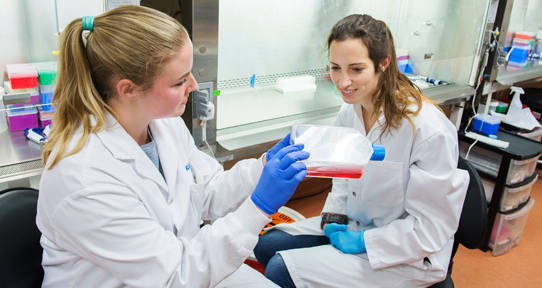Facilities

Excellent facilities and technical support
Modern science requires the right tools. Our students and researchers work with amazing instruments and facilities. We:
- analyze atomic structure
- screen yeast with a robot
- analyze molecular interactions with an ultracentrifuge
- work with animal models
- measure gene expression with array technology
- express pathogenic proteins in insect cells
- measure proteins binding DNA or proteins binding carbohydrates
- analyze cellular signaling with confocal microscopy
- culture cancer cells
- analyze protein expression with flow cytometry
- analyze viral genomes
- identify femtograms of protein with mass spectrometry
UVic Genome BC Proteomics Centre:
The centre provides exceptional service and support for proteomics research in the areas of protein identification and characterization, and quantitative proteomics for biomarker discovery and validation.
4Virology.net:
A bioinformatics resource for researchers working with large DNA viruses such as poxviruses, African swine fever virus, iridoviruses and baculoviruses. The resource provides databases and easy-to-use software tools that focus on comparative genomics analyses.
Biotechnical Support Centre:
This shop maintains and repairs laboratory equipment and instrumentation for the department’s teaching laboratories and faculty research groups. The biotechnical support staff have a broad range of expertise with instruments and equipment commonly found in laboratories involved in molecular biology, biochemistry and microbiology.
The Crystallography Suite:
The department is home to a new Rigaku MicroMax 007 rotating anode X-ray generator with VariMax HF confocal optics and Arcsec technology, a Pilatus 200k CMOS-based detector and an Oxford crysystem 800 cryo-cooler which enables the collection of X-ray diffraction data on single crystals at cryo temperatures. This technology supports a strong structural biology based research cluster within the department.
